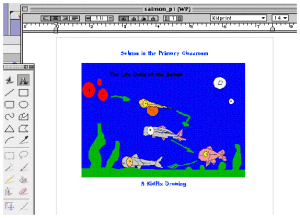IML Learning Capacities
Our World has changed, to reiterate Daniel Pink, “Are we preparing kids for their future or our past?” Too often we are preparing students for the past. Information and Media literacy focuses on a set of learning capacities, not on a checklist of skills to attain.
Do students need to learn the basics before they can explore the advanced?
No – students do need enough background, but that doesn’t need to be formal. A musician can play incredible music and be blind, or not know how to read music. A student can use a new software tool, without being taught every menu option.
Can Grade 2 students critically evaluate a website?
Yes – If you look, you will find teachers that have Grade 2’s access three websites, choose which site is best for their needs and justify their choices. We can have primary students interacting with the internet and learning to critically evaluate it. Obviously, students critique of websites improve with exposure and experience. A few years ago, I heard that Grade 2 are not agile enough to work with the mouse or type. There were very capable of using the mouse, typing, using the track pad and now touch interfaces. Infants are learning to use devices.
In 2004, students were alr eady able to use software to visually journal. For more than 10 years the ability has been there, but students are not always enabled to share their learning because the teacher, school, or district isn’t ready. Unfortunately, if a student struggles with writing, they are seen to be less intelligent. The measure of the thinking ability of the child was not in the thinking but in the output. Students that struggle to write can use the tools of today and tomorrow to show their thinking and express themselves.
eady able to use software to visually journal. For more than 10 years the ability has been there, but students are not always enabled to share their learning because the teacher, school, or district isn’t ready. Unfortunately, if a student struggles with writing, they are seen to be less intelligent. The measure of the thinking ability of the child was not in the thinking but in the output. Students that struggle to write can use the tools of today and tomorrow to show their thinking and express themselves.
IML attempts to put the focus on the learning and not on the output of the learning. Exploring learning capacities helps frame the discussion in changing the classrooms of today to meet the learners of today.
The learning capacities include:
Use (tools and information effectively)
Understand (role of technology and individual using technology in society)
Inquire (effectively access, organize, analyze, evaluate and explore information)
Create (evidence of learning and new knowledge)
Communicate (messages in a variety of forms. publish and collaborate responsibly)
Think Critically (demonstrating understanding of ethical, cultural and social implications)
Innovate (new) (to shift from a consumer of information and things to creating or innovating new things and ways to use them.)
They have been developed as Quick Scale and Full Scale Quick Scale
(Note they have not been updated since 2010)